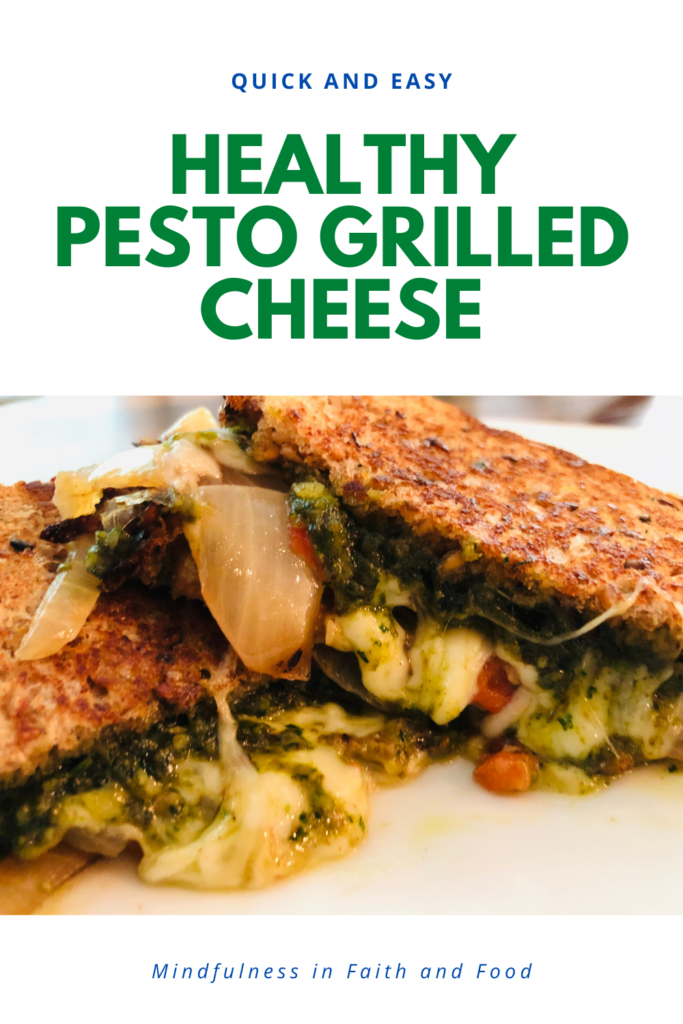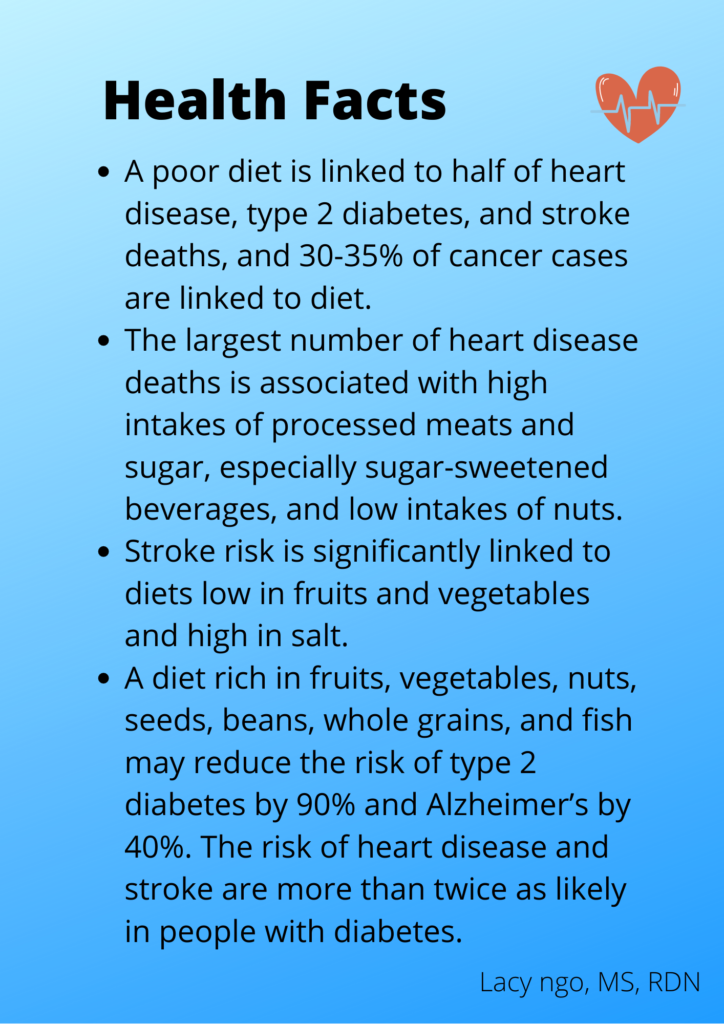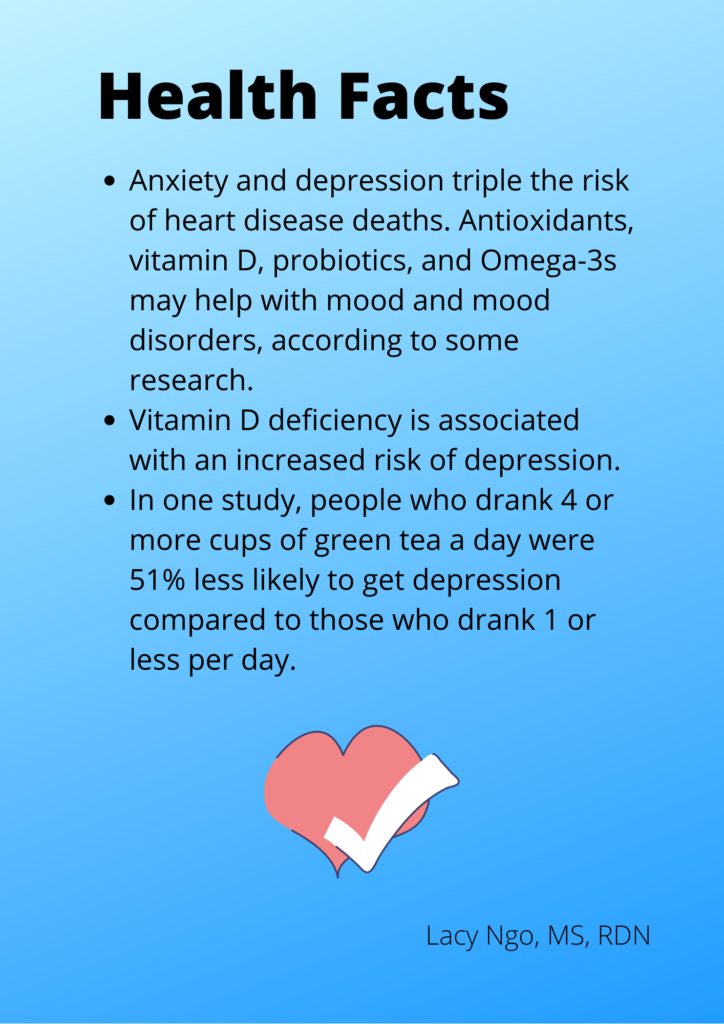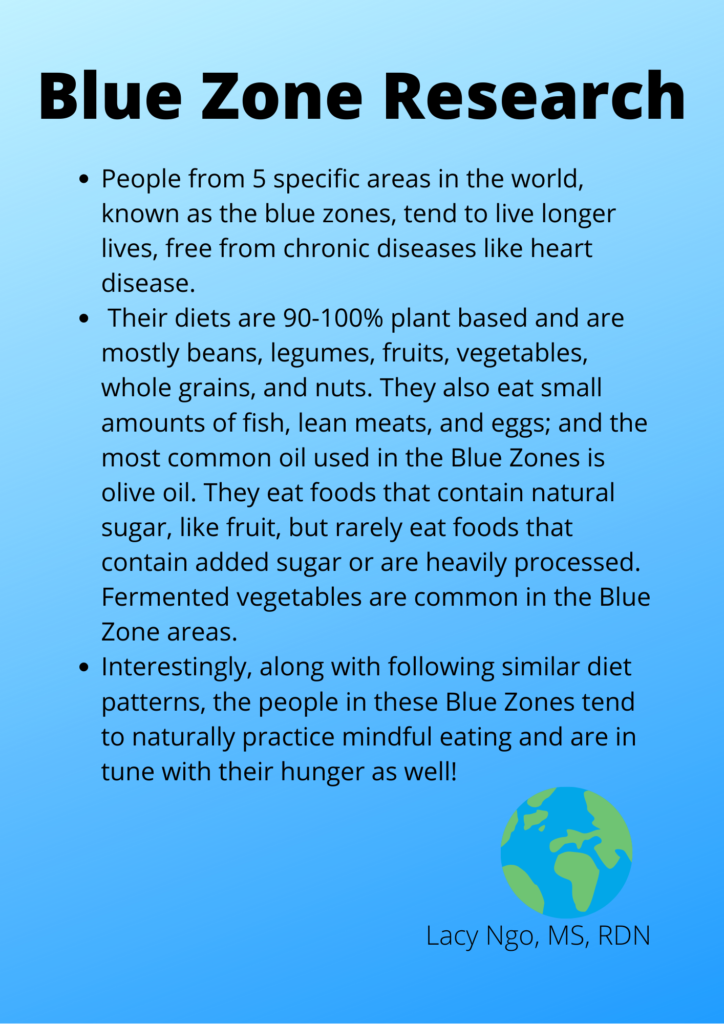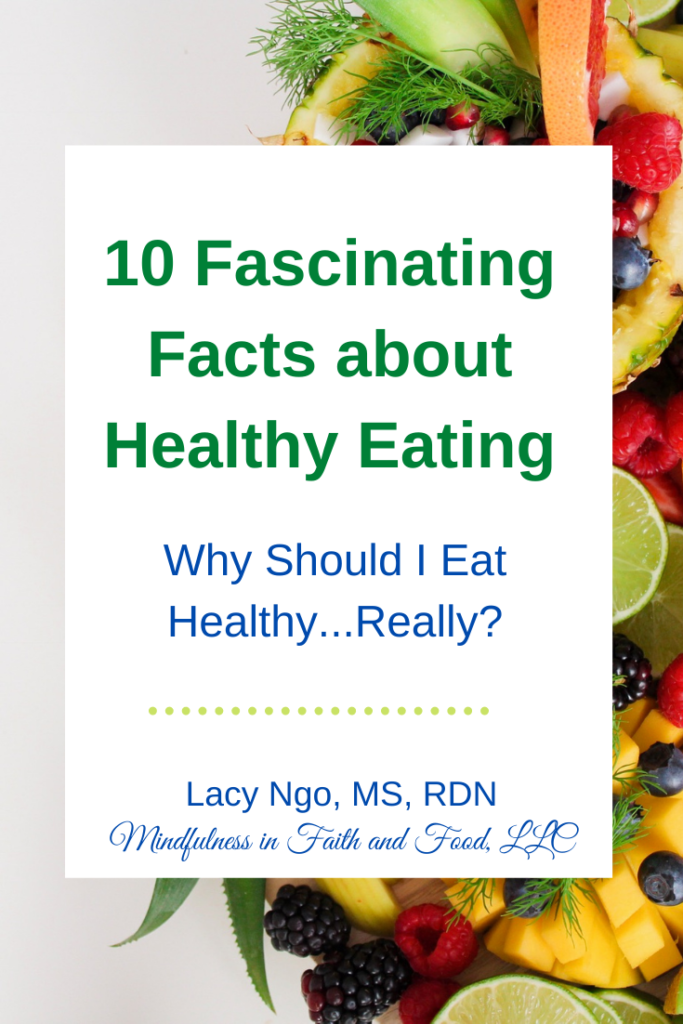When we think of nutrition for peak athletic performance, we are likely looking for foods that improve performance, speed, muscle mass, and quick thinking. We may also be looking for foods that help with muscle soreness and injury, and provide sustained energy. For many, big games and tournaments may cause feelings of nervousness; therefore, athletes may also want foods that help them feel calm while still keeping them alert.
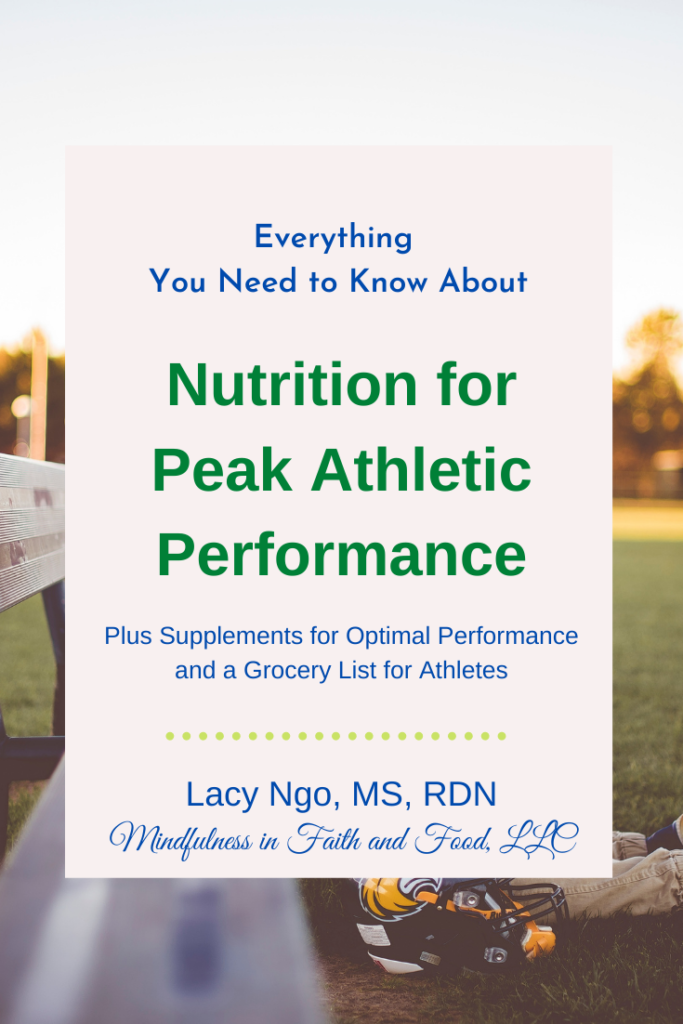
This site contains affiliate links (See full disclosure here.)
For this article, we will go into specific nutrients and their roles in athletic performance, but first let’s look at what the research says about the general diet.
The Mediterranean Diet and Peak Athletic Performance
The Mediterranean Diet emphasizes a mostly plant-based diet consisting of vegetables, fruit, whole grains, lean meats, fish, nuts, and seeds. These foods are high in antioxidants, fiber, omega-3s and other healthy fats, vitamins, and minerals. Antioxidants and omega-3s can fight oxidative stress brought on by heavy physical activity. Omega-3s may also delay muscle soreness (1).
One recent study looked at the Mediterranean diet, specifically. This particular study found that the participants became 6% faster after they followed a Mediterranean diet. (Before the study began, they were eating a more Western style diet). These improvement were seen in as little as 4 days (2).
The Ketogenic Diet and Athletic Performance
The Ketogenic diet has been looked at recently as a possible diet for athletes. Interestingly, the research found that while the ketogenic diet may benefit endurance athletes performing aerobic exercise; the keto diet actually decreased the performance of athletes performing anaerobic exercise (3). In other words, the keto diet could possibly benefit ultra-runners performing at a light to moderate pace for a long duration. However, before the keto diet is beneficial for these endurance athletes, the athlete’s body must adapt to using fat as the main source of energy. This benefit is NOT seen in high intensity athletes. For high intensity training like with soccer and sprinting, the keto diet may actually impair the performance of athletes. It should also be noted that there is abundant evidence that a higher carbohydrate diet improves athletic performance.
Based on this data, the keto diet is not recommended for athletes performing high intensity exercises for a shorter duration (under 3 hours).
Vegan and Vegetarian Diet and Athletic Performance
Based on 8 studies, the vegan or vegetarian diet does not provide an advantage when it comes to athletic performance compared to healthy omnivore eating. However, there does not appear to be a disadvantage to eating vegan/vegetarian as long as the vegan/vegetarian diets are well-planned and appropriately supplemented (5, 6).
Athletes need more protein than the general population so vegans will need to make sure they are getting adequate protein from food and, if needed, supplements. Other nutrients often found in animal products are vitamin B12, iron, zinc, calcium, iodine, vitamin D, and DHA and EPA omega-3s. Vegans may need supplements for these particular nutrients as well (4).
Some research does report that vegetarians have lower mean muscle creatine concentrations which may affect supramaximal exercise performance.
Macronutrient Needs for Peak Athletic Performance
Protein
Athletes generally need more protein than the general population; however, they can usually get their needed protein from food. Endurance athletes need around 1.2-1.4 g/kg body weight, while strength and power athletes need around 2.0-2.4 g/kg body weight.
Carbohydrates
Carbohydrates are needed for sustained energy. Without adequate carbohydrates, an athlete might experience what is often referred to as a “crash.” This is when the athlete’s energy stores are depleted and the athlete can no longer optimally perform or compete.
Healthy Fats for Athletes
We do have ample research that show certain foods can reduce the risk of cognitive decline and promote optimal brain function in not only the elderly, but also children and young adults. Healthy fats are super nourishing for your brain, and when the athlete’s brain is optimally nourished the athlete can quickly make those important split-second game decisions. Omega-3s have been shown to improve cognitive function in the elderly and in mice and have even been shown to improve brain function after a traumatic brain injury (7). We also have studies that show Omega-3 may benefit athletes, specifically. One placebo-controlled study of young female soccer players found that when the soccer players consumed DHA Omega-3, they had better reaction time, and a recent systemic review of 32 studies found similar benefits (15, 16).
Brain Foods for Athletes: Making Quick Game-Decisions
Vitamin E has been linked to better brain function in the elderly and has been shown to improve cognitive function in mice with traumatic brain injuries (7).
Antioxidants also appear to play a beneficial role in brain function. One study found that when older adults ate 1 cup of blueberries, which are rich in antioxidants, for 90 days, their memory and their ability to accurately switch tasks improved compared to the placebo. According to a systemic review of 12 studies, berries improved mental performance in children and adults (8).
Nuts, which contain healthy fats, antioxidants, fiber, and protein, are another fantastic brain food, according to research. One study found that children who ate nuts had better reaction times and performance on brain tests (9).
Other foods rich in antioxidants include vegetables, especially dark leafy greens; fruit, especially berries; nuts, seeds, green tea, and dark chocolate. Many spices are also rich in antioxidants. The antioxidant-rich curcumin, which is found in turmeric, appears particularly beneficial when it comes to slowing cognitive decline with aging. Vitamin B12 deficiency is linked to an increase risk of cognitive decline, Alzheimer’s, and brain shrinkage. Vitamin D is also an important nutrient for our brain function.
According to a few small studies, antioxidants may also reduce muscle soreness, muscle fatigue, and inflammation (13).
In contrast, some foods may have a negative impact on our brain function. Studies have shown that individuals who ate diets high in pizza, cheese, red meats, and high-fat dairy doubled their risk of developing Alzheimer’s, and diets high in sugar and refined grains, and ultra-processed foods (like white bread and pastries), increased the risk of cognitive decline.
You can learn more about how nutrient effect the brain here.
Grocer List for Athletes: Food for Optimal Performance
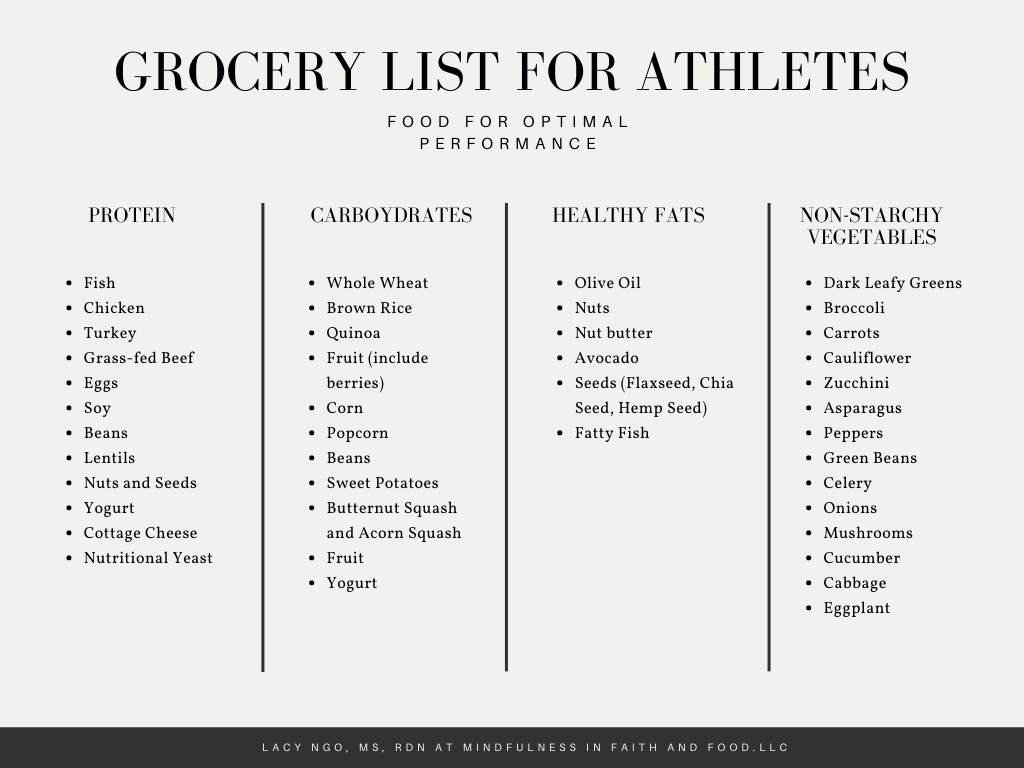
Calming Foods for Game-Day Jitters
On a game day, you want calming foods that won’t make you feel tired. Antioxidant-rich fruits and green tea are perfect game-day calming foods because they help you feel calm while also helping you feel refreshed and alert.
Consuming foods high in antioxidants, vitamin D, B vitamins, and healthy fats on a regular basis may also help reduce chronic, everyday feelings of anxiety.
Dietitians Green Tea Pick
Vitamin C
So far, it seems that taking vitamin C regularly does not prevent a cold in the general population, BUT when you do get a cold, ongoing vitamin C intakes may shorten the duration.
Vitamin C appears more impactful in the extreme athlete. Studies show that Vitamin C supplements may actually prevent colds in people who are exposed to strenuous physical activity such as marathon runners (10). The risk of getting colds may be reduce to half in these individuals.
Specific Foods for the Athlete
Garlic
Garlic may help with endurance time according to at least one study. According to this study, there was a significant increase in endurance performance time 5 hours after athletes consumed 900mg of garlic compared to the placebo (7). Animal studies also show an increase in performance endurance after animals consumed garlic (11).
Tart Cherry Juice
According to extensive research Tart Cherry Juice may aid in muscle recovery. This is believed to be the case due to the anti-inflammatory antioxidant, anthocyanin, found in tart cherries.
Dietitian’s Pick
Supplements for Athletes
*Quick tip: When choosing a supplement look for NSF, USP, or Informed Choice on the label.
A Note on Supplements:
While I take an optimistic approach with food in regards to their benefits, I am more cautious with supplements for two reasons. One, they can be expensive, and two, when taken in excess, supplements can become toxic. Some supplements can negatively interact with medications as well. In the case of food, however, even if the research is preliminary and conflicting as far as a particular benefit; if the food is generally healthy, why not incorporate it in our diets?
Always talk with your doctor before taking supplements. You also want to check and see which supplements are allowed by your sport.
Caffeine
In a recent review of seven randomized controlled studies, the researchers found that caffeine significantly increased physical performance in 6 of the 7 trials (12). Based on this review as well as other promising studies, caffeine appears to positively affect athletic performance by improving strength, endurance, and mental sharpness.
Creatine
Although the results are mixed, the majority of evidence indicates that creatine does appear to improve performance in some sports (13, 14). Creatine may modestly improve strength as well.
NSF Certified Creatine Supplement:
Bodylogix Micronized Creatine Monohydrate Power, NSF Certified
Creatine Sports Drink:
Ashwagandha
According to a recent systemic review, Ashwagandha may improve VO2 Max in athletes and non-athletes; however, further research is needed (8).
NSF Certified Ashwagandha
Sodium Bicarbonate
According to a few small, short-term trials, Sodium Bicarbonate may moderately improve athletic performance and power, especially in trained athletes (13). Nausea, vomiting, diarrhea have been reported by some.
Theanine
A combination of theanine and carbohydrates provides energy, relaxes the brain, and reduces stress and anxiety without inducing drowsiness, which, in theory, may help calm the nerves before a big game.
Ginger
In a randomized placebo-controlled trial, ginger appeared to reduce exercise-induced muscle pain by as much as 25%, although more studies are needed (14).
Ginger Juice Shots
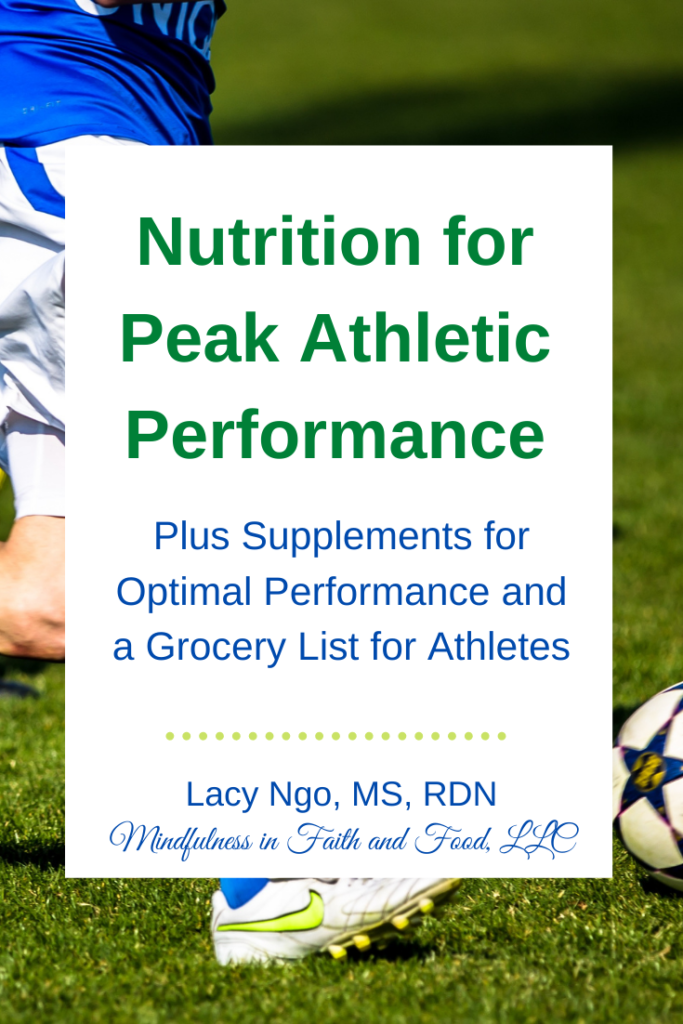
The Meal Before an Athletic Performance
The goal of the pre-exercise meal is to maximize glycogen stores (which is the storage form of readily available energy), provide adequate hydration, minimize hunger, and minimize any undigested foods that can lead to GI distress. In order to meet these goals, the pre-game meal should occur 2 to 4 hours before the game/performance.
The pre-game meal should be high in carbohydrates; that is 60 to 70% of the calories from that meal should be from carbohydrates. A high carbohydrate diet is needed to maintain glycogen stores and blood glucose. Muscle glycogen is used for energy during exercise, and liver glycogen stores are used to maintain stable blood glucose levels during athletic performance.
The pre-game meal should be moderate in protein. Only 10 to 25% of the calories in the meal should be from protein foods.
Finally, the pre-game meal should be low in fat, low in fiber, low in spicy foods, and low in simple sugars. Meals high in fiber may cause GI distress during a game.
Make sure you drink plenty of water before, during, and after an athletic performance or practice.
Pre-Game Meal: Quick Reference
- Eaten 2 to 4 hours before the performance
- High Carbohydrate (60 to 70% of total calories)
- Moderate in protein (10 to 25% of total calories)
- Low in fat, spicy foods, simple sugars, and fiber (To prevent GI distress)
Pre-game meal examples:
- 1 cup of pasta, spaghetti, or rice and tomato sauce
- Turkey sandwich and pretzels
Why is Salt Intake During an Athletic Performance so Important?
When you are exercising for an hour or less, plain water is recommended. However, if you are in an athletic competition for over an hour, you should begin replenishing your electrolytes, especially your sodium content. When we sweat, we lose water AND salt. We know that lack of water can be dangerous so we often make sure we are drinking plenty of water during an athletic performance. However, when you replenish the water in your body WITHOUT replenishing the salt in your body, the sodium content in your body becomes diluted. So the problem is not only that you lost sodium in your sweat, but that the sodium-to-water ratio becomes out of balance as you drink more and more water. This is called hyponatremia.
Unfortunately, symptoms of hyponatremia are similar to symptoms of dehydration so someone may think they are dehydrated and drink more water when, in fact, they are actually experiencing symptoms of hyponatremia. Drinking more water WITHOUT sodium makes the hyponatremia worse. Symptoms of hyponatremia include dizziness, lethargy, thirst, headache, nausea, cramps, irritability, and in severe cases even coma and death. Notice the similarity of the symptoms to the symptoms of dehydration? The take-home message is that water is crucial! We should drink water throughout any athletic event no matter how long the event. However, if the athletic event is over an hour, we should also drink a sports drink that contains water AND electrolytes.
During Performance Meal: Quick Reference
- HYDRATE
- Consume 30 to 60 grams of carbohydrates and drink a liquid containing sodium if the performance last for more than one hour to enhance endurance. Example: a banana or energy bar like a Clif bar
- You can get the needed carbohydrates, water, and electrolytes in drinks like Powerade or Allsport.
- Drink electrolyte drinks if you will be exercising for more than 3 hours; Examples: Powerade, Gatorade, or BodyArmor (These are carbohydrate sources as well)
- When exercising for extended period of time (marathon): Consume CHO every 15 to 20 minutes. Ex: Gel packs and energy bars like Powebar or Clif bar
* Put simply, drink 3-4 sips of water every 15 minutes if you are exercising for less than an hour. If you are performing for more than an hour drink an electrolyte and carbohydrate drink. If you are performing for greater than 3 hours, drink an electrolyte and carbohydrate drink and consume a carbohydrate snack/drink every 15 to 20 minutes.
Electrolyte/Carbohydrate Drinks
BodyArmor SuperDrink, Variety pack – 7 flavors – Including Jummybo mints
Powerade Sports Drink Variety Pack (20 oz. bottles, 24 ct.).
The Meal After Performance, BUT NOT Performing the Next Day
During exercise, the body is breaking down glycogen, triglycerides, and muscle protein for energy; therefore, the body must restore muscle, glycogen, and lipids after the performance. The meal simply needs to be a normal healthy meal. One-fourth of the meal should consist of healthy whole grains, one-fourth of the meal should contain lean meats, and half of the meal should contain fruits and vegetables. Note this is the after-performance meal when you do NOT have a performance the next day. However, the recommendations are slightly different if you are performing two days in a row.
After Game Meal, But NOT Performing the Next Day: Quick Reference
- Hydrate
- Normal Healthy Meal
The Meal After A Performance IF Performing AGAIN the Next Day
If you have finished an athletic performance, and are performing again the next day, your after-performance meal should take place within 30 minutes after you have finished competing. The number one priority should be replacing the fluid loss.
The meal should also be high in carbohydrates. A high carbohydrate meal is needed to replace glycogen stores. If you do not replace the glycogen stores, your body will use muscle protein to replace the stores. Many think that eating high protein is crucial to replace or build muscle after a performance; however, you need to make sure you are getting enough carbohydrates as well.
If your body does not have enough glycogen (carbohydrate stores); then your body is going to get glycogen by breaking down your muscles! You should eat 1 to 1.5 grams of carbohydrates per kg body weight every two hours for 6 hours! So if a person weighs 150 pounds, they could eat about 1.5 cups of pasta every 2 hours for 6 hours. So they would eat 1.5 cups of pasta three times in six hours for a total of 4.5 cups of pasta in six hours. Remember, you do not need to eat every 2 hours unless you are performing the next day. This is to build up your depleted glycogen store before your next-day performance.
The Meal After a Performance IF Performing AGAIN the Next Day: Quick Reference
- #1 priority: replace fluid loss
- High CHO: replaces glycogen; if you do not replace glycogen, your body will use muscle protein;
- Eat 1 to 1.5 grams of CHO per kg body weight, every 2 hours for 6 hours.
Related Posts
Sports Nutrition Books written by Registered Dietitians
A Dietitian’s Comprehensive Guide to Nutrition and Autoimmune Disease
Nutrition for ADHD, Autism, and General Childhood Behavior
Food and the Brain
Our Skin: Nutrition for Acne & Wrinkles
Nutrition for Cancer Prevention
A Comprehensive Guide to Nutrition and the Immune System

